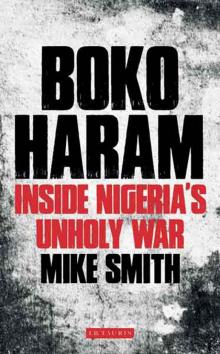- Home
- Mike Smith
Boko Haram Page 3
Boko Haram Read online
Page 3
Mapping out the details of what Boko Haram is remains extremely difficult. Even the name Boko Haram is something of an illusion. Roughly translated to mean ‘Western education is forbidden’, it was given to the group by outsiders based on their understanding of the budding sect and its beliefs. The group itself, or at least Abubakar Shekau’s faction of it, says it wants to be known as Jama’atu Ahlus Sunnah Lid Da’awati Wal Jihad, or People Committed to the Prophet’s Teachings for Propagation and Jihad.2 As for Shekau himself, little is known about him. The US government’s wanted notice lists three different possible dates of birth, 1965, 1969 and 1975. His vicious rhetoric and bizarre behaviour in video messages, where he has said he likes to kill humans when commanded by God to do so in the same way he enjoys killing rams and chickens, has led some to label him a psychopath. He also strangely refers to long-dead Western leaders as his enemies, from Abraham Lincoln to Margaret Thatcher. But simply labelling him insane is inadequate, a conclusion based on guesswork that ignores the possibility that he may be trying to provoke by acting in that way. There is also the question of whether it is always the same person appearing in video messages over the last several years. The appearance of the man identified as Shekau in videos has been significantly different at times.
All of this becomes quite confusing very quickly, but overall outlines have emerged and a larger picture can be assembled. It is perhaps best to think of Boko Haram as an umbrella term for the insurgency and the violence that has come with it, with an unclear number of cells or factions carrying out attacks. Foot soldiers may be shared or recruited as needed, drawn from the massive population of desperate young men vulnerable to extremist ideas and perhaps attracted to the money and support the group can provide. Any kind of true organisation may exist only at the very top, with limited cooperation between the various cells. Their aims seem to vary greatly, from the sincere will to create an Islamic state to the desire to collect ransom money, with many other motivations in between. ‘Do I think that the kids who abducted the girls in Chibok are the ones who set off the bombs in Jos? No’, one Nigerian official who has closely followed the insurgency told me. It appears that they finance themselves mainly through illegal activity, including ransom kidnappings and bank robberies. They have stolen weapons from the Nigerian military, and likely would not find it difficult to buy arms on the region’s black market. Explosives have also been stolen from private companies.
How much all of this involves politics has been continually debated. As elections scheduled for February 2015 began to draw near, new accusations of politicians financing elements of Boko Haram emerged – certainly a possibility, but if so, more likely on the margins. The overarching conspiracy theories repeatedly offered in Nigeria – northern elites seeking to bring down a southern president; southern power brokers seeking to discredit the north – do not hold up to scrutiny. There are simply too many varying interests, the range of targets too great, to be attributable to one sole purpose.
Concerning foreign links, as one well-versed observer put it to me in early 2014, it seems that a practical relationship has developed between certain Nigerian Islamists, particularly those identified with Ansaru, and the leadership of Al-Qaeda in the Islamic Maghreb or its offshoots. They seek out help when they need it, but otherwise act on their own. Another knowledgeable source, a Western diplomat with extensive experience in the region, told me in March 2014 that it appeared that cooperation involving training and weapons had been deepening over the last few years.
Shekau has pledged solidarity with jihadists globally, including ISIS in Syria and Iraq, but it has never been clear whether such feelings were mutual. For one, outside extremist groups would face the same problem that authorities and would-be peace negotiators have encountered when seeking to probe or communicate with Boko Haram: one never knows with whom one is dealing. Beyond that, Boko Haram’s mindless violence may not fit with more recent Al-Qaeda strategy, with the group’s leadership having expressed concerns over the indiscriminate killings of fellow Muslims and civilians by its regional affiliates.
Yet it is important to keep all of this in perspective. While links have formed with foreign groups and attacks have been carried out in neighbouring Cameroon, the various elements of the Boko Haram insurgency have remained Nigerian in their outlook. Though demands have ranged widely, they have to a large degree focused on local concerns. The insurgents have sometimes simply seemed bent on the destruction of the Nigerian state, seeking to tear everything down with no end goal in mind. In late 2014, the group again seized territory in parts of north-eastern Nigeria and declared it would be part of a caliphate, but it was not clear whether there were any true attempts at governing such areas.
‘While there are links and there’s procurement of weapons and there’s communication and a whole range of ties between Boko Haram and AQIM and to a lesser extent al-Shebab, it really remains a domestically focused group in the sense that their enemy really is the Nigerian federal state and certain state officials’, the same Western diplomat said. ‘And I think that in an opportunistic manner they cooperate and have communications with transnational groups that may be committed to the global jihad like AQIM, but that’s not their primary objective.’
It is a problem born and bred in Nigeria – and one that Nigerians must resolve amongst themselves. The conditions that have given rise to it must remain the focus of any potential solution.
Nigerian President Goodluck Jonathan, a Christian from the Niger Delta, has offered little beyond heavy-handed military raids that have led to accusations of widespread abuses against civilians – including shootings of innocent people, the burning of homes, torture and indiscriminate arrests. The government has engaged in doublespeak, at one point claiming to be involved in back-channel talks in a bid to halt the violence, but later dismissing this, with the president calling the Islamists ‘ghosts’ who refuse to show their faces. Shekau, whose whereabouts are unknown and who has often been rumoured to be dead, has repeatedly ruled out dialogue in videos.
While it is impossible to know for certain whether it is always the same man in Shekau’s video messages, it would also not seem to matter much. Regardless of whether there have been Shekau look-alikes, attacks have continued and even worsened. ‘If in fact he is dead, then it shows that we are in a much worse situation than we thought’, the Nigerian official who has followed the situation closely told me. In other words, it showed he could easily be replaced without an interruption in the violence, while the decline of the Nigerian army, largely because of corruption, has left little hope that it can defeat the insurgency. Soldiers ‘would rather go to the Niger Delta to make money’, he said, referring to the allegations of members of the army being involved in the lucrative oil theft racket and other crimes in that region. ‘Whoever is doing this knows they can get the Nigerian army involved in a war they cannot win.’
The lack of faith in both the government and the military has remained one of the most important reasons why the insurgency has not been stopped. ‘I don’t know that northern populations have a great affinity for Boko Haram or whatever they’re advocating, and civilians and moderate Muslims have been the principal victims along with security forces of course’, the Western diplomat said. ‘But there’s this sea of indifference in which they are able to operate because you just don’t have a lot of loyalty or affinity for a central government which is seen as completely clueless and, more importantly, unresponsive to the legitimate needs and grievances of local populations.’
As for recruitment into Boko Haram, some see a cycle of poverty and lawlessness as a main cause. ‘Religion is the basis of recruitment, so that’s why they can get so many people, but the incentive for people to get into it and remain in it is the profit they make from it’, Clement Nwankwo, a respected Nigerian civil society activist based in Abuja, told me in June 2014. ‘So if there is money available and these people would ordinarily live a street life, where they don’t know what they get for the da
y, but here somebody’s paying their bills, somebody is feeding them, clothing them and giving them some little profit [...] And then there is really very little consequence for their actions. They can get away with it. The military hasn’t been able to respond in a way that proves a disincentive for them to continue this path.’
In the meantime, the list of the dead only grows longer, each attack helping push the unrealised potential of such an important nation further out of reach. In the south, in the country’s largest city of Lagos, steps have been taken in a bid to begin taming the famously chaotic former capital of some 15 million people, whose hours-long traffic jams and exhausting pace of life have become legendary, leaving even the most resilient souls gasping for air. Lagos, along with the rest of the south, has been mainly spared the violence, though there have been questions over whether an explosion in June 2014 claimed by Boko Haram signalled the end of the city’s relative peace. If so, the insurgency would reach yet another, far more dangerous stage, and the shoots of progress that have taken root would be tragically ripped out.
There have of course been other bright spots, and recently Finance Minister Ngozi Okonjo-Iweala, a former World Bank managing director, and Central Bank Governor Lamido Sanusi have worked to bring about reforms where possible and reduce corruption. But the frequent refrain in Nigeria is that when one fights corruption, corruption fights back. When Sanusi began to publicly ask questions in 2014 about billions of dollars linked to the state oil firm missing from Nigeria’s accounts, he was removed from office by the president. From an aristocratic family, he has since become the emir of Kano, one of the country’s most highly respected traditional rulers. He has not entirely abandoned his criticism of government corruption.
* * *
By May 2012, Maiduguri, still considered the home base of Boko Haram, resembled something approaching a war zone. Entire neighbourhoods appeared deserted and security checkpoints kept the city on edge. Christians trying to attend church passed through metal detectors and razor wire, with women forced to leave their bags outside. It was by no means only Christians being targeted; Muslims were often the victims. Residents were caught between the incessant attacks and the heavy-handed response of soldiers, who had been accused of rounding up young men for arrest, burning homes and killing civilians.
The extremists had taken to burning schools, and yet classes were still being held in at least one of the damaged buildings. At that school, a teacher said parents insisted that it remain open, so students dressed neatly in yellow and green uniforms were there scampering among piles of broken glass and shards of cement. ‘I’m not scared because I think the worst has happened’, one 14-year-old girl said as she stood near scorched walls and collapsed tin sheets. ‘There’s nothing left for them to attack.’
How tragically wrong she would turn out to be. On the night of 14 April 2014, hordes of attackers would descend upon the town of Chibok and swarm the boarding school where several hundred girls were sleeping. They were dressed as soldiers and they told the girls not to worry, that they were there to protect them. They led them outside and towards waiting pick-up trucks, and it slowly began to dawn on the girls that these men were not members of the military. They fired their guns and shouted ‘Allahu Akbar’, and they forced the girls into the trucks before driving away towards a camp in the forest. Military reinforcements did not arrive. Parents, their daughters gone and the school burnt, set off towards the forest on motorcycles. They had no choice but to try to find the girls themselves.
1
‘Then You Should Wait for the Outcome’
Geoffrey Njoku heard it, the sound of a bang and the screech of metal on metal, a distant crash somewhere outside. It was a Friday morning, and the 53-year-old was inside a Standard Chartered bank branch on the ground floor of United Nations headquarters in the Nigerian capital, Abuja. He had gone there to take care of some routine personal banking before returning to his work at UNICEF offices on the third floor. Besides the bank staff, there were only two customers inside, Njoku and another person, but other areas of the sprawling, four-storey UN building, spread out over three wings in the shape of a Y in the city’s diplomatic district, were already buzzing with the day’s activity. When the crash rang out around 10.20 a.m., Njoku said out loud in the bank, ‘What’s that sound?’
Up above on the first floor, at least two meetings were in progress. Soji Adeniyi, a UNICEF specialist in emergency planning walking with crutches at the time because of a broken leg, was leading one of them, attended by around 10 colleagues from various UN departments. It had started at around 9 a.m., more than an hour earlier, and was supposed to wrap up by 10 a.m., but it ran over, so they were all still there, in one section of an open-space work area cordoned off with movable partitions, a large table set out in the middle. Adeniyi, too, heard a sound, ‘as if it were a crash through a door or something’, and also did not know what to make of it.
Vinod Alkari, a UNICEF expert from India who had worked in post-invasion Iraq, had not heard anything. He was on the third floor speaking with his colleague Shalini Bahuguna, asking whether she had seen his email related to a water, sanitation and hygiene programme. She seemed distracted and did not respond, confusing Alkari, and instead asked him if he had ‘heard something falling’.
Presumably sometime before that – perhaps days, perhaps weeks – a 27-year-old, softly spoken man in a polo-style shirt had stared into a video camera, his head wrapped in a turban, an AK-47 rifle in his hands and two others leaning against a wall on either side of him. Two gas cylinders, the type used to manufacture bombs, sat in front of him. He was thin, and the way he occasionally smiled made him appear meek. He spoke in Hausa, the predominant language in northern Nigeria, and seemed almost apologetic at times as he meandered through his speech. He was wearing something that looked like a suicide vest.1
As the young man explained what he was preparing to do, he said that he had no choice, that he must carry out Allah’s bidding, and he asked his mother, father and wife to understand, while also hoping that his son would follow in his footsteps. At certain points, the sound of what seemed to be a child could be heard in the background along with the clanking of someone apparently tidying up or putting away dishes.
‘I am going to shed my blood and I pray to Allah to make me steadfast’, said the young man, later identified as an auto repair worker named Mohammed Abul Barra. ‘May he take me there safely [...] My mother, my father and my wife, these three people, I call on you to be patient. I know you will be at great pains by losing me, especially you, my mother [...] It is the love of God that made me to be obedient to you and it is the same Allah that commanded me to go and carry out this mission. He even wonders if we prefer our parents, children or relations or the wealth we amassed, or a mansion you built. If you prefer this to Allah, his Prophet and jihad, then you should wait for the outcome.’
His described his belief that a suicide attack would lead him to paradise and hoped the same for his own son.
‘Then my son, my son Barra, the son of Allah, may Allah nurture you on the path of the Prophet to make you useful to Islam, to make you follow my footsteps and do what I am about to do now, which is called suicide attack.’
Later in the video, a group of unidentified men took turns giving him hugs, presumably to bid him goodbye. He was then shown sitting in the driver’s seat of a grey car and spoke again, this time offering a disjointed message to the US president. When he finished, a blurry and shaky sequence showed a car being driven down a road.
‘I tell Obama and other world leaders they were created by Allah in the same way he created us’, he said while seated in the driver’s seat. ‘So whoever rebels against Allah and goes against his dictates, whatever his status, especially Obama, who is their leader, if he does not repent and convert to Islam, if he dies, he’s going to hell and live therein for ever. Obama and other infidels should know God knows about them and is only giving them a respite. And if he seizes them, they
have no excuse.’
On the morning of 26 August 2011, as Njoku was banking, Adeniyi was conducting his meeting, Alkari was trying to sort out his sanitation project and many other UN staffers were going about their usual business, the driver of a Honda Accord would make his way into the diplomatic district of the Nigerian capital, a city newly built with petrodollars, its wide boulevards and concrete office buildings giving it an artificial feel in comparison to much of the rest of the country. The driver would pull on to the street leading to UN headquarters, where some 400 staff worked, before directing his car towards the exit gates of the compound and barrelling through.
In the building itself, the atrium and reception area were located where the three branches of the Y converged, facing out in the direction of the two angled arms, about 100 metres away from the gate. The driver moved towards it, crashing through the glass and entering the building. When he did this and burst into the reception area, shattering the glass front and colliding with a wall on the inside, a bizarre moment of uncertainty would occur. Those inside the building seemed unsure how to react, and one woman would walk towards the car. After a few moments, some would begin to run away, seemingly realising that this may not have been an accident. It would be more than 10 seconds before the bomb exploded, pulverising much of what surrounded it.2 The force of the blast collapsed walls and shattered windows, raining down shards of glass in parts of the building as if it were a hail storm.

 The Sunfire
The Sunfire The Last Praetorian (The Redemption Trilogy)
The Last Praetorian (The Redemption Trilogy) The Mandate of Heaven
The Mandate of Heaven Pax Imperia (The Redemption Trilogy)
Pax Imperia (The Redemption Trilogy) Boko Haram
Boko Haram